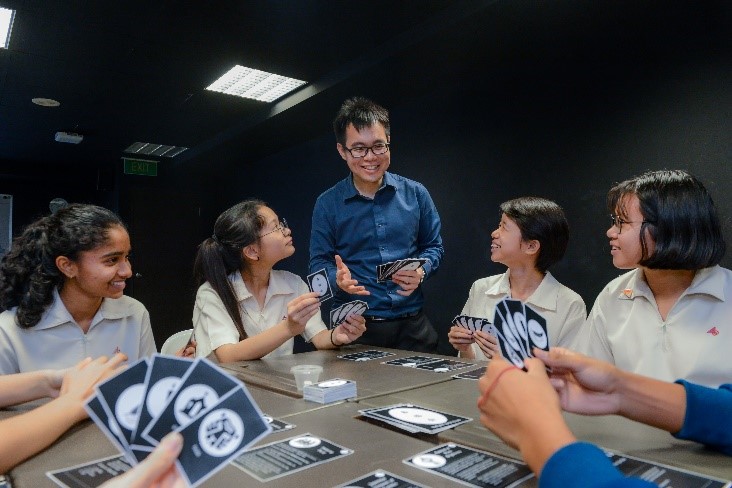Mr Ow Yeong Wai Kit, Bukit Batok Secondary School, Outstanding Youth in Education Award 2019 Recipient
A card game for Literature class
My class of secondary four Literature students squealed with delight when I showed them stills from the mahjong scene in the film Crazy Rich Asians.
They were all film buffs, but more crucially, they were also studying a Literature text in which mahjong plays a vital role: Amy Tan’s 1989 novel The Joy Luck Club.
It was precisely to foster such a lively conversation about the symbolism of the game, and its significance in their O-level text, that I made a card game based on the novel.
As with mahjong, the card game requires four players. It allows students to assume the roles of the characters and develop a deeper sense of empathy for them, so as to better understand the plot and the novel as a whole.
My motivation was simple. I believe that effective teaching is about creating memorable events and experiences for students. My students should enjoy their Literature texts, because the study of literature is the study of life. It helps students understand others’ words, recognise biases, and explore their innermost emotions. It also aids them in articulating ideas about texts, while responding actively to one another.
Start your own Joy of Learning Club
I believe that every class, every school, and every community can be a ‘Joy of Learning Club’. During English class, this may entail getting students to dress up and role-play characters in comprehension passages or Literature texts. Or students can analyse popular songs by Bruno Mars or Ed Sheeran. They can conduct mock trials in class, acting as plaintiffs, defendants, judges and bailiffs, delivering their own speeches about their texts, and cross-examining one another. In this way, they can learn the importance of argumentation and evidence-based reasoning, while enjoying every step of the process.
The key consideration is that students must be involved in the process. In my English classes, students take ownership of their weekly oral presentations. Every Thursday, each member of the class gives an ‘expert talk’ on a topic of their choice, after being given a week to prepare. One girl gave a fascinating talk about dentistry; another about the history of memes. The question-and-answer segment is a crowd-pleaser, as rows of hands shoot up and the presenter has to defend his or her arguments. We analyse one another’s speeches in detail, with comments such as: ‘It was a great speech but when you finished, people didn’t know when to clap because you didn’t end with a thank-you. What other ways could you have concluded more effectively?’
Other efforts that my students and I initiated included a poetry mural on our school campus, which was painted by our own alumni, students, and staff. We also edited a magazine, featuring all of our school’s arts events, which we shared with schools in China and other countries. These initiatives – fuelled by our enthusiasm, fervour and zest for learning – have sparked joy amongst the students.

Students dress up and play characters in their Literature texts.
Promoting a positive attitude towards errors
A Joy of Learning Club is not only about playing games. It is also about fostering an environment in which it is normal to make mistakes. Being comfortable with struggles and errors is a vital step towards learning.
During English lessons, I may ask students to fill in the blank for ‘A leopard never ____ its spots.’ They will give a range of responses, to which I would say, ‘Which of these options do you think is my favourite wrong answer?’
A few students may stare blankly. Some will hazard a guess. The common wrong answer that many students give would be ‘change’ and it shows how easy it is to forget to inflect a verb to suit the subject of a sentence (the right answer is ‘changes’). I praise students regardless of whether they give the right or wrong answer, because the class can discuss their contributions and learn from them.
Sometimes, students might avoid asking questions out of fear and embarrassment. We can make a difference by being mindful of the words we use when inviting questions. After I finish covering a topic, I have stopped asking: ‘So do you have any questions?’ This invites a yes-or-no response, and the ‘no’ is almost never true. Students often claim to understand things even when they don’t.
Instead, I ask: ‘What are some questions you now have about this topic?’ The small shift in the phrasing signals to students that having doubts is normal, asking questions is integral to learning, and that they should never fear to seek clarification.

Our poetry mural shows that poetry is for everyone: poetry can inspire students to develop lifelong habits and dispositions.
Ultimately, instilling the joy of learning is critical for students to be prepared for the future. Of course, some might claim that joyful learning experiences are secondary to what really matters—results. My response would be this: when students are led to enjoy the process of learning, the results will take care of themselves. Students can become genuinely self-directed learners, gaining the drive and self-confidence they need to succeed in life. Perhaps the mahjong players in Crazy Rich Asians would approve.




.jpg)
.jpg)
